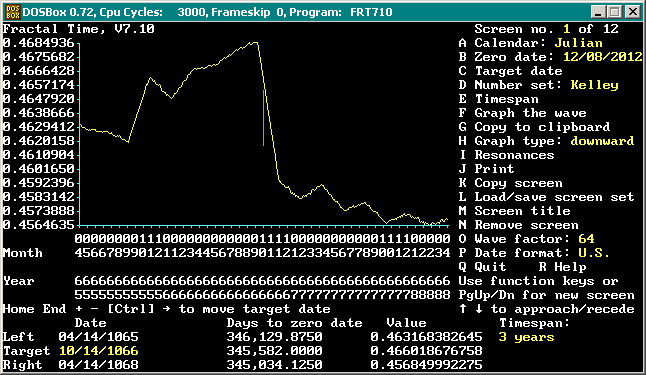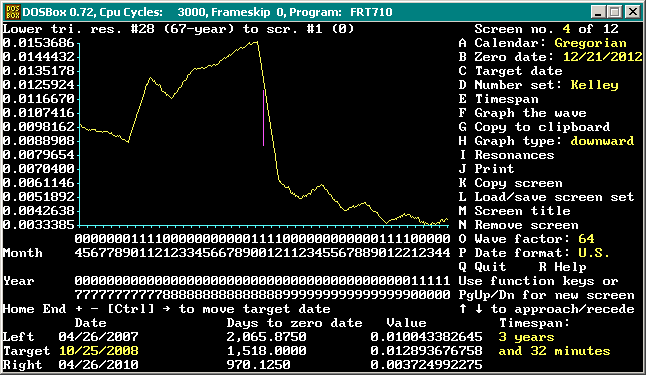| The "Battle of Hastings" Timewave Zero Resonance |
It is debatable as to whether the Timewave Zero theory was meant to be, or should be regarded as, a 'scientific' theory in the usual sense, that is, a theory put forward to explain some observable phenomenon in terms of what is already understood. A 'theory' which explains what is obscure in terms of what is even more obscure (such as the existence of animal life in the natural world as a result of creation by some supernatural entity) cannot be called 'scientific'.
Timewave Zero theory asserts that there is something intrinsic to the physical world which is quantifiable (a quantity called 'novelty') and that certain (not clearly specified) changes in this quantity are correlated with the occurrence of observable phenomena which we intuitively recognize as novel, that is, as new and unexpected. What this intrinsic quantity is is about as obscure as it is possible to be.
Timewave Zero theory also asserts that there is a definite relation between the quantity 'novelty' and empirical time, with the reservation that this depends on the choice of some point in time, called the 'zero point'. More exactly, given a point z in time (usually taken to be 6 a.m. GMT on December 21, 2012 CE) for any point t in time such that t is not later than z, a value v (the 'novelty' value) is determined by the value of z-t.
The change in the novelty value which has principally been asserted as most likely to be correlated with novel phenomena is a sharp and prolonged decrease. The author of this theory, Terence McKenna, pointed to many instances of major descents in the graphical timewave which, he said, were correlated with major novel events or periods in history.
It is thus reasonable to expect that, if the theory is 'true', then we could predict novel periods or events by an examination of the ups and downs of the timewave. An opportunity to do this now presents itself, since an exact trigrammatic resonance to the period within which the Battle of Hastings of 1066 occurred will soon occur in 2008.
The Battle of Hastings, in which King Harold was killed and the largely French army of William "the Conqueror" was victorious, was the decisive event in the Norman conquest of England. It occurred on October 14, 1066 (in the Julian Calendar).
Those who have the Fractal Time software may follow along. Run the software (if necessary, after running DOSBox), select December 21, 2012 (Gregorian) as the zero date and the Kelly number set (this also works with the Watkins set). Select screen 1 and select the Julian Calendar (this causes the zero date to change to December 8, 2012). As the target date enter October 14, 1066. Specify a time period of 3 years, graph the wave and you'll see that October 14, 1066, occurs during a major descent.

Now select 'Resonances' to construct a set of 12 trigrammatic resonances. Select '2' for the 67.29-year resonances. Say 'Yes' to the question 'Search for similar trigrammatic resonances?' Specify '0' for maximum divergence (so only exact trigrammatic resonances will be returned). After the search has been completed, four exact trigrammatic resonances will have been found. Select screen 4 and you'll see that the date of the Battle of Hastings is resonant with October 11, 2008, in the Julian Calendar. Switch to the Gregorian and you get the date October 25.

The major descent in 1066 starts at 1066-10-26 JC and drops smoothly to 1066-11-29 JC, then there is a milder descent to 1067-02-01 JC. The resonant period in 2008 (which is, to be exact, the 28th lower 67.29-year trigrammatic resonance) starts at 2008-10-07 CE and drops smoothly to 2008-12-10 CE, then there is a milder descent to 2009-02-12 CE. The Battle of Hastings (and its resonance date of 2008-10-25) occurs 19 days into the 65-day period of the descent.
According to the Timewave theory, we can expect some major event in the last three weeks of October 2008 which is as novel as the Battle of Hastings was in October 1066, and which is of a nature comparable to it. The actual resonance date of the Battle of Hastings is, as noted above, October 25, 2008, ten days before the U.S. presidential election on November 4.
Clearly one is inclined to expect some military event, if not a 'battle' then at least a 'crisis'. This can be expected for reasons which have nothing to do with Timewave Zero, but everything to do with the election. Another minor war of the sort that was fought between Russia and Georgia in August 2008 would likely motivate many Americans to vote for John McCain, who (unlike his opponent) has considerable military experience (mainly flying a plane and bombing, strafing and terrorizing Vietnamese civilians).
However for this test of the Timewave Theory to count as a confirmation of the theory the event (or events) of late October 2008) would have to prove to be of historical significance, as was the Battle of Hastings (which turned England over to permanent Norman control and installed the Normans as a class ruling over the indigenous Anglo-Saxon inhabitants of England).
In the absence of any major military event in the last three weeks of October 2008, proponents of the Timewave theory have a fall-back position. They can assert that it was actually the Russia-Georgia War which was the 2008 event which is resonant with the Battle of Hastings. This claim has merit insofar as (a) this was an actual battle and (b) it has had (already) significant historical consequences (marking as it does a major change in the relations between Russia and the NATO countries, particularly the U.S.).
The problem with this claim, of course, is that the 5-day Russia-Georgia war began on August 7 (when the Georgian army bombarded Tskhinvali), which date is two months before the start of the the 2008 major descent which is resonant to the 1066 descent within which the Battle of Hastings occurs. However, since 67.29-year trigrammatic resonances are separated by 12,288 days, it could be claimed that the 79 days by which the Russia-Georgia war preceded 2008-10-25 is a minor discrepancy, being off by a mere 0.64%, though it is debatable whether acceptance of this claim is consistent with the rigor that should accompany a properly scientific theory.
The Global Financial Crisis as a Candidate for Resonance
The article above did not foresee the novel event which in hindsight is a prime candidate for resonance with the Battle of Hastings, namely, the start of the so-called global financial crisis. As noted in the article, "The resonant period in 2008 ... starts at 2008-10-07 CE and drops smoothly to 2008-12-10 CE". The web page The Start of the Global Financial Crisis (2008) informs us that:
On 7 September 2008, it was announced that two firms, Fannie Mae and Freddie Mac, would be nationalised to try to ensure the financial stability of the two firms. ... One week later, on the 14th September 2008, it came to light that the financial services firm, Lehman Brothers, would file for bankruptcy after being denied support by the Federal Reserve Bank. Later the same day, the Bank of America announced that it would be purchasing Merrill Lynch. ... Due to the above factors, there was major instability on the global stock markets with major decreases in market value between the 15th and 17th of September 2008. ... On the 16th September, the American International Group (AIG), which suffered due to its credit rating being reduced, was helped by the Federal Reserve which created an $85 billion credit facility to stop it from collapse. ... Over the next two weeks, more banks failed and the two remaining banks-Goldman Sachs and Morgan Stanley converted into 'bank holding companies' ... On 28th September it was announced that Fortis, a large banking and finance firm would be semi-nationalized with Luxembourg, Belgium and the Netherlands investing over 11 billion Euros into the company. ... Finally, on Tuesday 30th September 2008, stock markets begain to rise again, although the credit markets remained very tight. ... The events described above started a plethora of problems in the economic and political world and continued through the end of 2008 into the beginning of 2009 ...
There are, however, a couple of problems with this candidate. The first surprise of the global financial crisis occurred on September 7, 2008, which is a month before the start of the 2008 resonance on October 7. Secondly a global financial crisis is not quite the same thing as a decisive military victory by an invading army over a defending domestic army. However, it makes more sense if the international bankers are seen as an invading army and national governments and the common people are seen as a defending domestic army, since the global financial crisis was a major victory for the international bankers: The big banks received billions of dollars in "bailout" loans from governments, who had to borrow from the international bankers in order to provide the loans, thus committing themselves to huge interest payments (apart from repayment of the loans themselves) for the foreseeable future and obliging them to make huge cuts in social spending (health, education, public transport, etc.), so the result was a huge transfer of wealth from the common people to the international bankers.